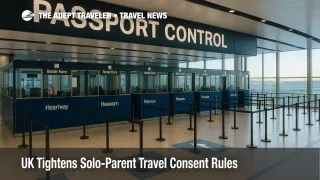UK Tightens Solo-Parent Travel Consent Rules

Solo-parent travelers bound for the United Kingdom are facing closer scrutiny at passport control. Border Force officers now routinely ask for a notarised letter proving consent from the non-traveling parent. Failure to present acceptable paperwork can delay entry, trigger further questioning, or even force denied boarding. The policy follows several high-profile child abduction cases that exposed gaps in outbound checks. Families should prepare by packing original identity documents and a properly formatted consent letter before traveling.
Key Points
- Why it matters: Missing consent letters can stall entry or cancel flights, costing families money and vacation time
- Letter must list child and adult IDs, trip dates, notarised signatures, and medical-treatment permission
- Officers may also demand birth certificates, custody orders, or name-change documents to confirm parentage
- Online generators such as LawDepot and LawDistrict offer downloadable Word and PDF templates for UK use
Snapshot
Border Force confirms that officers at Heathrow, Gatwick, and regional airports have begun asking for notarised parental-consent letters whenever a minor arrives with only one legal guardian. The practice brings UK checkpoints in line with Canada, South Africa, and several Caribbean nations that already mandate written consent. Airlines have quickly updated pre-departure document checks: some carriers now require proof at the boarding gate to avoid fines for transporting improperly documented minors. Families report inspection times of 10-15 minutes when paperwork is complete, but much longer holds when documents are missing.
Background
UK immigration rules grant officers wide discretion to question adults traveling with children, yet no statute explicitly mandates a consent letter. Instead, officials rely on Section 55 of the Borders, Citizenship and Immigration Act 2009, which places a duty of care on authorities to protect child welfare. Recent abduction and human-trafficking cases exposed loopholes that allowed one parent to remove a child without the other's knowledge. Stakeholder meetings between the Home Office, airlines, and children's charities produced new frontline guidance, circulated in April 2025, that recommends officers seek notarised proof as best practice. The guidance mirrors long-standing advice posted on Gov.uk for taking a child abroad.
Latest Developments
Border Force Steps Up Checks
Since May, airports report a 40 percent rise in secondary interviews involving solo-parent parties. Officers are instructed to verify that every adult with parental responsibility has signed the letter and that the notary seal is legible. Common rejection reasons include missing passport numbers, undated signatures, or unclear custody terminology. Travelers with different surnames face added scrutiny, requiring marriage or deed-poll certificates. Airlines such as British Airways now alert customers during online check-in that failure to show a compliant letter may bar boarding. Consulate officials urge U.S. families to travel with two notarised originals-one for the airline, one for Border Force-in case an officer keeps a copy.
Analysis
The United Kingdom's tightened stance reflects a broader global trend toward safeguarding minors amid rising trafficking concerns. While no formal law compels consent letters, the operational reality is unmistakable: officers expect documented proof and will use their discretionary power to detain or refuse passengers who cannot provide it. For U.S. families, notarisation adds roughly $40 USD in administrative cost but avoids far greater expenses linked to missed flights, last-minute hotel stays, or legal representation. The practice also shifts responsibility upstream to airlines, which face civil penalties for carrying improperly documented children. As carriers hard-wire consent verification into check-in systems, the requirement is likely to become de facto mandatory, even without parliamentary action. Travel advisors should update pre-trip checklists, and destination marketers should clarify entry expectations to prevent unpleasant surprises.
Final Thoughts
With Border Force actively requesting notarised consent letters, solo-parent travelers can no longer rely on informal email permissions or verbal assurances. Preparing a detailed, properly notarised document-backed by birth certificates and custody papers-keeps family holidays on track and shields children from risk. Staying ahead of the policy shift means treating the UK parental consent letter as essential as a passport.
